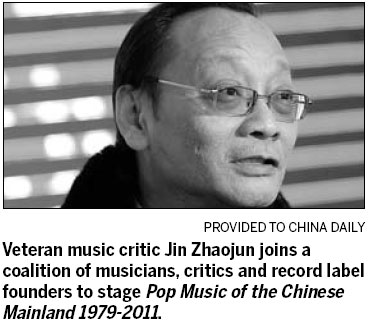


As the industry struggles, a comprehensive retrospective of the mainland's contributions to the genre looks back - and forward. Chen Nan reports.
Jin Zhaojun sold pants at a State-owned shopping center in Beijing for a year before he took the national university entrance exam in 1977, when the country resumed university classes after the "cultural revolution" (1966-76).
Life was dull before that. He made 36 yuan (about $6) a month. His girlfriend broke up with him because he didn't earn as much as State-owned factory workers, who brought in 42 yuan a month.
After he became a Chinese literature major at Beijing Normal University, Jin - like many young people then - was excited to absorb classroom knowledge.
It was during this time that he also discovered pop music from Taiwan's singers, such as Teresa Teng and Steven Liu, which came to the mainland after the reform and opening-up began in 1978.
He spent 360 yuan - a huge sum at that time - on a single-track audio cassette player and listened to pop music all day.
The 54-year-old is now the Chinese Musicians Association's vice-secretary-general and a veteran music critic.
Jin has joined a coalition of musicians, critics and record label founders involved with the mainland's pop music development to stage a series of events titled Pop Music of the Chinese Mainland 1979-2011. The event will collect and review the genre's hits during the period.
"We called it tongsu (common) music, rather than pop, 30 years ago," Jin recalls.
"Pop was then considered vulgar. Much has changed as we've continued down the path of development. It's time to reflect on what we've done and where we're going."
The pop music industry was shocked last year when Song Ke, the former manager of the mainland's largest pop label Taihe Rye Music, announced he was quitting to run a roast duck restaurant.
"Everyone says the record business is dying and that piracy is killing it," Jin says.
"Song even called it 'dead'. But he returned to the industry as the general manager of the upstart Evergrande Music, didn't he?"
Jin says his coalition wants to show different generations the great works the genre has produced and its future potential.
"Tapes and CDs aren't the most popular formats anymore," he says.
"But we can find new ways to present music."
That's not an easy task, Taihe Rye Music's CEO Zhan Hua says.
To this end, the coalition began last year to collect mainland singers' pop albums. They've collected more than 15,000 tapes and CDs, the oldest of which is Zhu Fengbo's tape Roses Open Everywhere, which was released in 1979.
The organization will select the best 100 albums in addition to the best 100 songs from the past 33 years in early 2013.
Capital Indoor Stadium will host a concert reviewing the period in April. Next year will also see the release of a documentary, the publication of books and the staging of forums on the topic.
The former host of the mainland's first pop chart - started in 1993 on Beijing Radio Station - Zhang Shurong says: "Capital Indoor Stadium symbolizes mainland pop's glory days. All the pop stars have held concerts there."
Twenty-one judges led by Jin, including musicians, critics and record company insiders, will vote on the best albums and songs.
San Bao, a 20-year veteran songwriter and producer, says: "Disputes will inevitably arise when we announce our best 100s, which is a good thing. People of different ages have different favorites.
"But the final results aren't important. We just want to remind people of the past and leave something for future generations."
Contact the writer at chennan@chinadaily.com.cn.